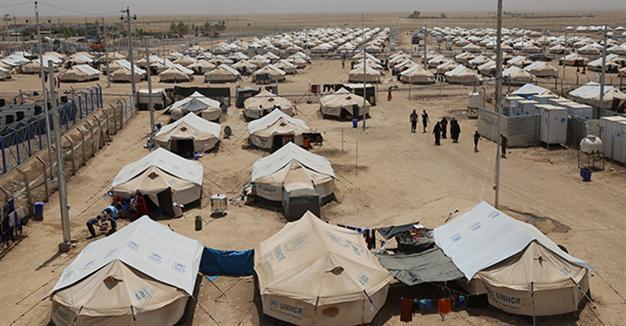Iraqi Kurdish state dream crushed by low oil prices, political division
Tolga Tanış – ARBIL
 Economic woes triggered by a big drop in global oil prices and political divisions that have sharpened over the last years have crushed Iraqi Kurds’ long-term dream of founding an independent state.
Economic woes triggered by a big drop in global oil prices and political divisions that have sharpened over the last years have crushed Iraqi Kurds’ long-term dream of founding an independent state.Around three years ago, when a barrel of oil was $110, when the Islamic State of Iraq and the Levant (ISIL) was not as big a threat to the region and the world, when Kurdistan Regional Government (KRG) President Masoud Barzani’s legitimacy was not under strain and when international actors supported the process, Iraqi Kurds were voicing their dreams of forming an independent state.
Barzani even met U.S. President Barack Obama in Washington and told him about this desire, but this dream has hit rock bottom due to five main developments in the region and the world.
The fall of the oil price from a high of $110 to as low as $26 has resulted in significant changes for Iraqi Kurds not only in terms of their dreams but also their daily lives.
From being called the “new Dubai” with the accompanying building boom, Arbil now stands as a city that is full of abandoned building sites.
The economic crisis is “the existential threat for Kurdistan,” said Qubad Talabani, the KRG’s deputy prime minister, in a speech he gave in Washington.
Back in 2011, the KRG decided to sell the oil it drilled in its area via Turkey, risking the money Baghdad would send to Arbil. This strategic decision caused problems inside the country and between Ankara and Baghdad too but due to the high oil prices at the time, the KRG continued to pursue its decision.
But when global oil prices dropped, around 1.5 million people who had been added to the civil service to cut down on the risk of political risks began to go without their salaries. The financial problems civil servants have been experiencing have also affected the country’s economy, leading to a halt at many constructions sites.
The Planning Ministry said that around 4,000 projects had been halted due to a lack of permission, 500 of which are schooling projects.
Political struggle
Political battles have also taken their toll on the dreams of an independent state.
There are three influential parties in the KRG: Barzani’s Kurdistan Democratic Party (KDP), former Iraqi President Jalal Talabani’s Patriotic Union of Kurdistan (PUK), and Nawshirwan Mustafa’s Movement for Change (Goran), which split from Talabani around nine years ago. There are also two Islamists parties – the Kurdistan Islamic Union (Yekgirtu) and the Kurdistan Islamic Group (Komal Islami), although they are not as influential as the first three parties. But the Kurds in KRG are so overwhelmed and angry at the corruption and political struggles that they do not even want to name a party to support.
Barzani’s presidency was supposed to end in 2013 but it was prolonged for another two years, after which he was again supposed to depart in August 2015, but did not, citing the ISIL threat and economic hardships. Parties entered into negotiations but failed to reach a deal, leading to Goran being removed from the KRG cabinet and Arbil. Goran subsequently took refuge in Sulaymaniyah, where Talabani has a strong hand.
Some have suggested that the political chaos could be solved by granting autonomy within autonomy, in which Barzani would control the Arbil and Duhok regions and Talabani would control Sulaymaniyah and Kirkuk with a similar autonomous status, with all the entities to be linked to central Iraq.
ISIL threatens the region
The third reason for the disruption of the idea of an independent state is the ISIL threat, which has also caused other problems threatening the existence of the possibility of an independent Kurdistan.
Since ISIL captured Mosul, which lies 50 kilometers from Arbil, ISIL has changed the balance in the KRG. An Iraqi Kurdish peshmerga commander said that when ISIL attacked the region in 2014, they saw their flaws as the peshmerga could not defend Makhmur or Sinjar and there was no coordination between each other inside the Peshmerga forces.
The ISIL threat has also altered the security risks and increased the investment risks and the amount of expenditures on security.
1.8 mln refugees for 5.5 mln inhabitants
Another effect of ISIL is the number of migrants living in the area. While the KRG population is around 5.5 million, the current number of migrants and displaced people in the region is 1.8 million.
Only 250,000 of these people are from Syria and fit the definition of a refugee but the rest are Iraqis who have fled their homes and sought refuge in the Kurdistan region. Because most of the people do not fit the international term of a refugee, the United Nations and international charities cannot fund these people, referring them instead to Baghdad, only for the Iraqi government to refuse to help the KRG due to the political crisis.
At the same time, international powers also do not want an independent Kurdish state in the Iraq, with Washington rejecting such an idea to avoid disrupting the fight against ISIL and irking Baghdad.
















